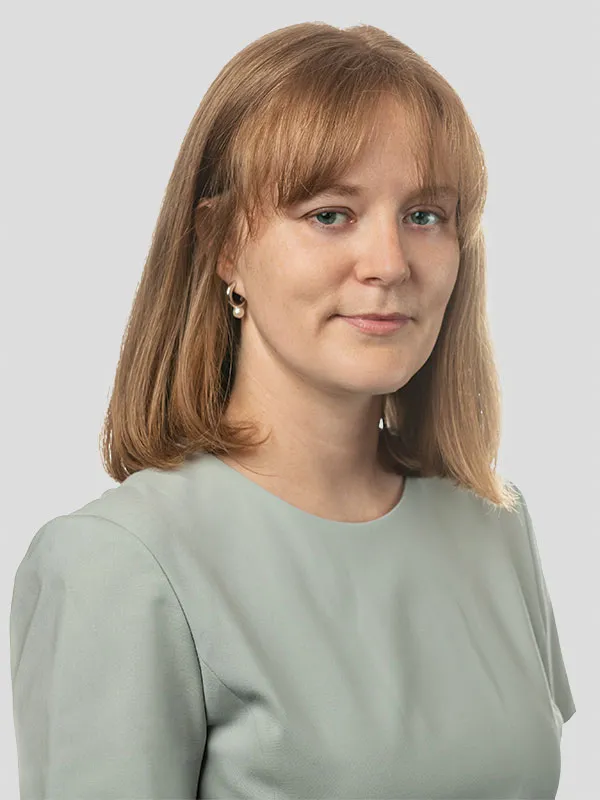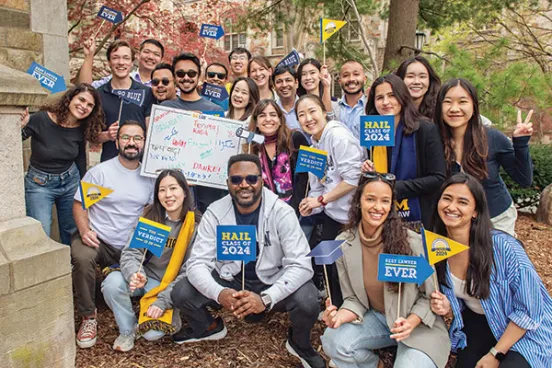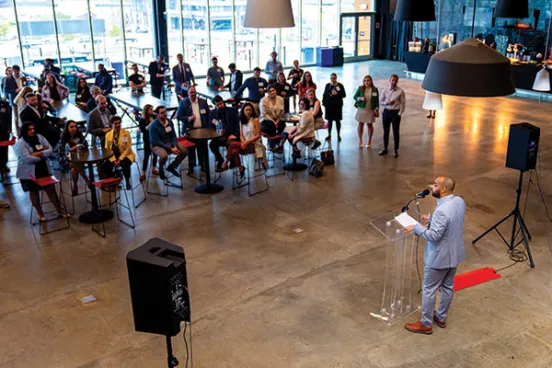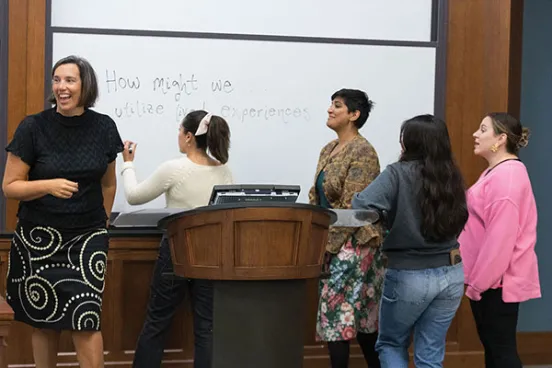From artificial intelligence and machine learning to blockchain and cryptocurrencies, law and technology is a complex and growing field. Law Quadrangle recently asked two of our leading law and technology scholars three questions about what’s been on their minds lately:
What is the most interesting thing that you’re working on right now? What do you consider to be the most significant development in your area of law since you entered academia? And outside of your specific field, what is a recent piece of scholarship that caught your eye from another member of the faculty, and why?

Aaron Perzanowski
Perzanowski, the Thomas W. Lacchia Professor of Law, teaches and writes about the intersection of intellectual and personal property law. Much of his work explores the notion of ownership in the digital economy. His books include The End of Ownership, co-authored with Jason Schultz (MIT Press, 2016); The Right to Repair (Cambridge University Press, 2022); and Creativity without Law, with Kate Darling (NYU Press, 2017), which collected scholarship related to intellectual property and social norms.
Most of my energy these days is focused on my current book project, The Licensed Library. The book considers the implications of libraries shifting from print collections to digital materials. Unlike the print books libraries have owned and controlled for centuries, ebooks and other digital assets are licensed by publishers and delivered by third-party aggregators. As a result, the relationship between libraries and those materials is conditional and tenuous, exposing them and their patrons to new risks. Libraries can no longer guarantee that books will remain available, since publishers can terminate licenses or disable access to ebooks. Publishers can even unilaterally edit the content of the ebooks that libraries offer. Despite these drawbacks, ebook licensing fees have exploded, straining library budgets and reducing spending on print materials. Ultimately, the move to digital collections threatens the independence and long-term survival of libraries as public institutions.
For the set of issues I research, one of the most problematic developments in recent years is the growing acceptance by courts of the licensing model for consumer transactions. From digital media to embedded software code, courts have embraced the narrative that rights holders can transform a sale that transfers meaningful rights to consumers into a conditional grant of permission simply by insisting that the transaction is a “license.” The Ninth Circuit’s decision in Vernor v. Autodesk was an important inflection point. There, the court held that Autodesk didn’t actually sell plastic discs containing its software to purchasers; it merely licensed them. As a result, Autodesk could stop the resale of lawful copies of its software as long as its license agreement recited the appropriate restrictions. That decision and those following it undermine copyright’s first-sale doctrine, the right to repair software-enabled devices, and, more broadly, our personal property rights in the things we use every day.
Roseanna Sommers’s article “Consumer Psychology and the Problem of Fine Print Fraud,” which was published a couple of years ago, has really stuck with me. The paper uses an experimental approach to measure how consumers respond to false representations that contradict terms buried in contractual fine print. Despite these material deceptions, consumers believe such agreements are enforceable as written. That belief discourages consumers from taking legal action or otherwise asserting their rights. This sense of resignation is consistent with my own empirical research on digital media transactions and the right to repair. In both of those contexts, consumers recognize a mismatch between the legal rights they expect and the rights license agreements actually offer. For a small minority of consumers, this mismatch is the source of real frustration. But most of us simply shrug off these incursions as a predictable byproduct of economic and legal systems designed to protect the interests of manufacturers and retailers. Roseanna’s work has informed my thinking by helping me make sense of what might otherwise seem like counterintuitive consumer behavior.
Aaron Perzanowski, the Thomas W. Lacchia Professor of LawOne of the most problematic developments in recent years is the growing acceptance by courts of the licensing model for consumer transactions.

Salomé Viljoen
Viljoen, an assistant professor of law, teaches and writes about contracts, privacy, commercial surveillance, and data governance—particularly the political economy of data and artificial intelligence. She is especially interested in platform power, how information law structures inequality, and how law theorizes data about people (i.e., "social data"). Viljoen’s academic work has appeared or is forthcoming in law reviews including the Yale Law Journal and the Columbia Law Review. She also writes essays in publications such as Nature, the Guardian, and Phenomenal World.
I’m finishing up a piece right now on data value. By now, we all know that digital companies collect lots of data about people and that person-generated data is very important to the digital economy—it’s used to predict and place ads by companies like Meta and Alphabet, to train social media feed algorithms for companies like X and TikTok, and is key to the impressive predictive capacities of AI systems like ChatGPT.
But the way that law approaches or understands data value, and what drives companies to collect data to make money, is quite odd. Legal regimes like privacy and data governance protect against certain ways, though not all the ways, that collecting and using data about people might expose them to risk of harm. But these laws aren’t really designed to regulate or contemplate the value proposition of data, and thus the strategies companies use to maximize that value. And legal regimes like tax continue to apply to the value produced at the end of this process for companies and people. But a lot of interesting and reasonably novel strategies are being used by companies in between data collection and some end profit, behaviors that warrant closer scrutiny. This project is an attempt to take a closer look at all those strategies, and try to suggest a few ways that legal scholarship might better grasp the role that data about people plays in our contemporary economy.
Public discourse about digital technology has changed quite a lot. Compared to when I first started researching commercial surveillance and the digital economy around 2016, there is far more recognition of how socially disruptive digital technologies can be, even as they enable all kinds of benefits. On the other hand, there remains a disconnect between developments in the scholarship about digital tech and how digital tech is regulated. Scholars over the past several years have highlighted how inadequate our current legal system is to deal with digital technologies like AI, and the need for new legal rules that share the risk, benefit, disruptions, and wealth of these systems more broadly.
Ed Fox does fantastic work on the taxing strategies of the wealthy. Some of his recent scholarship focuses on one tax strategy among the wealthiest individuals: taking loans out against their capital. This allows them to live off of the wealth of their capital without paying capital gains, and is a topic of increased coverage and focus in conversations of how to better tax the wealth of the very wealthiest. Ed shows that while this behavior does exist, and addressing it would result in increased tax revenue, it only represents a small portion of the overall strategies of the very wealthiest in lowering their tax burden and accumulating untaxed wealth. Ed’s work is such a great example to me of high-quality empirical work aimed at understanding a pressing issue. Work like this can guide and inform priorities for making the tax system fairer, and focus political and legal reform efforts to where they will have the greatest impact.
Salomé Viljoen, assistant professor of lawThere remains a disconnect between developments in the scholarship about digital tech and how digital tech is regulated.







